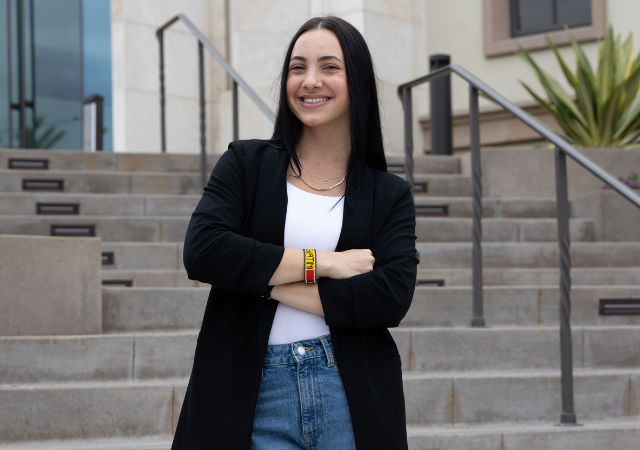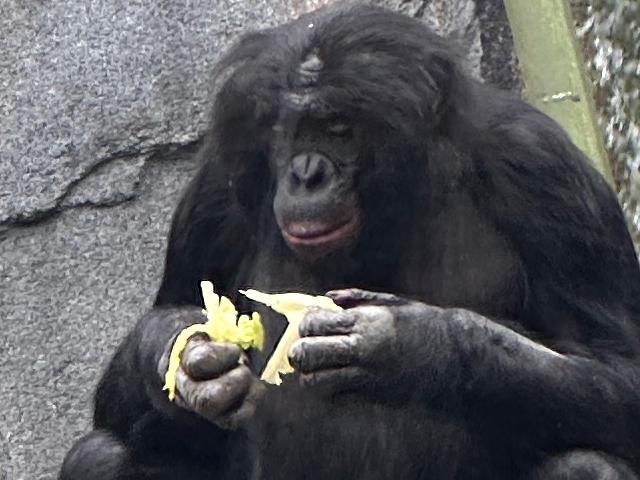Provost-VP Gail F. Baker Receives Hometown Honor
University of San Diego Provost and Vice President Gail F. Baker, PhD, loves her native hometown of Chicago. It holds many special memories — family, friends, a Catholic education, two college degrees, working on a local Emmy Award-winning historical documentary project and a childhood memory of watching 20 Chicago Cubs baseball games in the summer of 1969 with her father.
“Every time you hear about me, you're going to hear about Chicago, because it's such a part of who I am,” said Provost Baker, who was born in Chicago and lived there until her late 20s.
On Feb. 27, Baker's hometown honored her. The Office of the Clerk of the Circuit Court of Cook County and the Clerk Office’s African American Employees Committee hosted its 21st annual Black History Month event. One of the highlights was to honor Provost Baker among 11 recipients of the African-American Community Treasures Award.
Provost Baker said the organization’s Black History Month celebration is something special. “This is a time when this very huge office pauses to say, ‘this is part of our community, African-Americans in the city of Chicago have done wonderful things.’ To me, this award represents somebody noticing you are contributing, and it enriches Chicago and Cook County. I love my hometown and I miss it, but it’s really an honor to think that people would say, ‘Even though you’re gone, you’re still a part of who we are and we treasure who you are.’”
Provost Baker took some time to answer questions about the award, the support she receives, her thoughts on leadership, community service, overcoming obstacles and more.
Question: When you received this honor, what was the first thing that came to your mind?
Baker: I was so humbled to have been nominated, and then to receive this honor from my hometown, where I don't even live anymore, and to have people recognize the work I’ve been doing is a very humbling feeling.
Q: What does it mean to you as an African-American Community Treasures Award winner?
A: Being an African-American from Chicago, being a part of that community for as long as I have lived, even as a person who does not live there now, for people to think of me as a treasure in a community that has so many treasures, so many people, who've done so many extraordinary things, is an extreme honor. I'm very, very proud to have been chosen for this award.
Q: You're a mother, wife, sister, family member and community member. What does this award mean to them that you’re receiving this honor?
A: My family is always very supportive. They treat every accolade I receive like the first one. They're always excited, always nearby, always energized, very proud of me. As a mother you don't think of your children being proud of you, you think about being proud of them, so it is doubly rewarding when your husband, children and your family are proud of you for something you were just doing because you thought it was important to do.
Q: What are some defining moments that got you to this point?
A: I've been blessed with family, with parents who migrated to Chicago from the South in the 40s and decided that was where they wanted to raise their children. Having a Catholic education throughout my life. I went to Catholic school from first grade to 12th grade, and the importance of faith in our lives and families' lives. My parents converted to Catholicism because it was the religion they chose for their children. Being able to go to college — I am a first-generation college student and graduate, but I never thought that I would not go to college. It was just expected from people who did not know anything about college. Having sisters, a father and mom who always supported me. Having an education that launched me, gave me core values on top of learning how to do the things I loved to do.
Q: As a USD leader, how do you look at it in terms of how far it has come since you've arrived?
A: USD is a phenomenal university. I've only been here 2.5 years. I’ve seen the university live up to the promise of Envisioning 2024, which is our strategic plan. We look at our facilities — we have a library renovation, the Learning Commons, which is a classroom building that will expand learning opportunities for our students that is on the way up. We have a pledge for a new business school, a new business dean, we have students coming in every day. I knew this was a place on the move when I got here, but the last 2.5 years I’ve been here, the pace, acceleration, the drive and the enthusiasm around USD has only grown.
Q: This award recognizes your community service. What does community service mean to you, especially knowing it is such an important value for USD’s mission?
A: One of the things that attracted me to USD was the institution's commitment to community, being part of an anchor institution. I was part of an anchor institution at my previous school and what that means to me is that you're not just of the community, you are part of the community. We don't sit separate from our community. Community service means doing those things that the community tells you it needs to get done, recognizing your role and your impact on it. Everything we do has an impact on Linda Vista and on San Diego, possibly. Community service, to me, means recognizing that you are a citizen of a community and that your decisions make a difference, good or bad. What we try to do, of course, is make decisions for USD in alignment with what Linda Vista needs.
Q: What does it mean to be honored as a tribute to being part of the community?
A: Chicago is a wonderful community. Several years ago, I was able to work on a documentary about the history of Black Chicago, African-Americans, in that city from its founding to 2008, which is when we did that work. There have been so many leaders and wonderful people who've come out of Chicago and continue to live in the city. What’s particularly special for me is that one of the honorees is also my sister, Jacquelyn Tolliver (retired chief deputy clerk/traffic division) who retired just few months ago. It’s a double honor for me to receive an award that my sister, who has been in Chicago all of her life, is also receiving. I'm sorry I am not there to pick it up, but my niece, her daughter, will pick it up on my behalf. It’s apparently the first-ever time that siblings have received this award simultaneously.
Q: What would your parents say about their daughters winning this award?
A: Our parents, I don't think, could have imagined this. I don't think they could have imagined me being here, her being there. They'd be extremely proud. Any award I receive is always a tribute to them. In comments I send to my niece, I’ll be sure that everyone is aware of that.
Q: Part of this award is “going beyond what is expected.” What does that look like to you?
A: When you hear the term, “going beyond what is expected,” I would ask the question, “Expected by whom?” What an institution, a job or community might expect of you or in this case, me, is not what I expect of myself. I don't feel I've gone beyond what was expected. People from the outside looking in can say “Wow, what a list of accomplishments.” For me, these are things I'm supposed to be doing. I understand that's the theme, but as far as I'm concerned, I haven't done nearly enough.
Q: What's the lasting impact you want to have on the world, on your community?
A: I’ll borrow from the Boy Scouts: “Leave it better than when I found it.” When I'm gone, or when I’ve left the community, I want people to feel like my being there, somehow, enhanced and improved the community in which I lived.
— Ryan T. Blystone
Video by Daniel Telles
Contact:
USD News Center
news@sandiego.edu
(619) 260-4681


